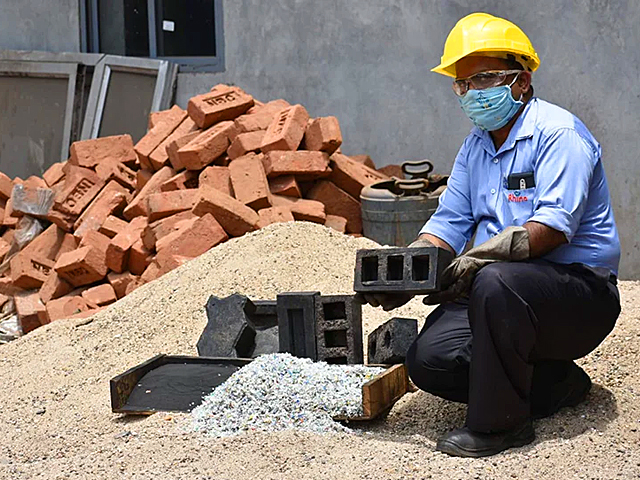SUSTAINABLE BRICK CREATES A NEW FOUNDATION
17 Jun 2020
Rhino Machines has launched a sustainable building brick made from recycling foundry dust and sand waste, and mixed plastic waste, which attempts to confront the excessive pollution in India.

The ‘silica-plastic block’ or SPB is constructed from 80 percent recycling foundry dust and sand waste, and 20 percent mixed plastic waste. SPB attempts to confront the massive dust waste and overall pollution production in India, which has created a severe environmental hazard. the project was completed in collaboration with R+D Labs; the research wing of the architectural firm R+D Studio.
The SPB project started with a clear mandate of producing zero waste from the sand reclamation plant in Rhino Machines’ foundry plant. In the initial stages, experiments were conducted by using foundry dust in cement-bonded fly ash bricks (7-10 percent waste recycled) and clay bricks (15 percent waste recycled). This experimentation also required the use of natural supplies such as cement, fertile soil and water. The amount of natural resources consumed in the process was not justified by the waste it was able to recycle. 
These trials led to more research by the inhouse research and development team, resulting in a possibility of bonding the sand/foundry dust with plastic. By using plastic as a bonding agent, the need for water during mixing and thereafter curing is completely eliminated. The blocks can be directly used after cooling down from the moulding process.
The SPBs were found to have 2.5 times the strength of normal red clay bricks while, to be consumed, they need around 70 to 80 percent of the foundry dust with 80 percent lesser use of natural resources. With further testing and development, newer moulds were prepared to test them as paver blocks and the results were successful. 
Over the period of four months, various industries such as hospitals, societies, individuals, social organizations and the local municipal corporations were approached to provide clean plastic. In total, six tonnes of plastic waste and sixteen tonnes of dust and sand from the foundry industry were collected, ready to be recycled.
Since the SPB is made of waste, the cost of production can easily compete with the commonly available red clay brick or the cmu (concrete masonry unit). Rhino Machines is now preparing to come up with an ecosystem solution so that the foundries across the country can develop and distribute the SPBs within their impact zones through CSR (corporate social responsibility – a Government of India initiative for businesses to undertake philanthropic causes and give back to the community). 
The SPBs could be used to build walls, toilets, school campuses, health clinics, pavers, driveways etc. and could see a cleaner future for construction.
Via designboom | Images via Rhino Machines







